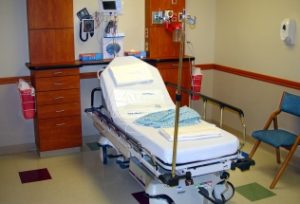Eating Disorders: Look No Further Than The ER
 Diagnosing an eating disorder can be challenging.
Diagnosing an eating disorder can be challenging.
But a new study suggests there may be a specific location to target when trying to spot one: the emergency room.
Eating disorders, substance abuse and depression
The University of Michigan research found that 16 percent of young people aged 14-20 who were admitted to the ER for a non-psychiatric reason had signs of an eating disorder. More than 940 participants were screened for the study, and those who had signs of an eating disorder also showed signs of substance abuse and depression.
Experts say that, for many young people, ER visits are more common than regular check-ups or doctor visits, making the ER an important place to screen them for signs of mental health issues.
“They come in for other things, and it’s up to health care providers to know what to look for,” said Suzanne Dooley-Hash, M.D., lead author of the study.
Spotting problems with proper screenings
Dooley-Hash also notes that many teens come into the ER complaining of stomach or intestinal problems, but they don’t want to admit that they might be due to an eating disorder. These teens can often go years without being diagnosed, especially if they’re not seeing a doctor on a regular basis.
“ER teams can be equipped to refer patients for care, just as we do for substance abuse. It could be a wake-up call, a teachable moment, a chance to tell them they need to seek help and direct them to resources,” she said.
Challenging stereotypes
Interestingly, the study found that teens who showed signs of eating disorders in ER visits were three times more likely to be obese than their peers–a statistic that snuffs out any stereotype that a person with an eating disorder must be dangerously thin.
In the past, ERs have used patient visits as a time to screen for substance abuse or reckless driving. Researchers hope this study will encourage ERs to also check for eating disorders. Dooley-Hash notes that the earlier a teen is diagnosed, the better his or her chances are for recovery.
Source: Psych Central
 Eating Disorder Self Test. Take the EAT-26 self test to see if you might have eating disorder symptoms that might require professional evaluation. All answers are confidential.
Eating Disorder Self Test. Take the EAT-26 self test to see if you might have eating disorder symptoms that might require professional evaluation. All answers are confidential.